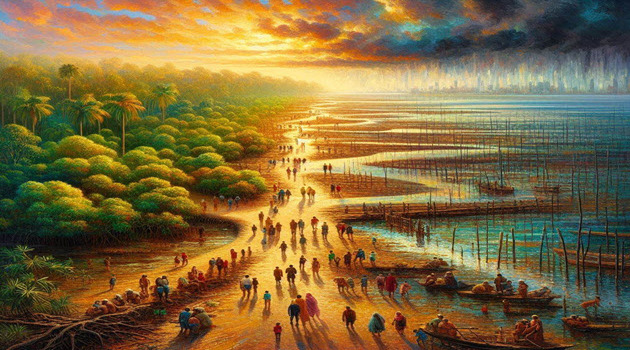But as the climate crisis intensifies, this city is becoming a test case for how climate change reshapes coastlines and communities.
From rising seas to surging cyclones, the effects are rippling through every layer of life in the Northern Territory's capital.
The City is facing escalating social, economic, ecological, political, and cultural challenges.
While heatwaves and extreme weather strike hardest in the short term, deeper transformations loom, impacting heritage, migration, and identity.
Climate change isn’t coming—it’s already here.
And in Darwin, the story is being written in heatwaves, rising tides, and the resilience of those who call the Top End home.
🌡️ Social Strains: From Heatwaves to Migration
In the short term, heatwaves are intensifying across northern Australia, with Darwin residents experiencing more than 50 days over 35°C annually.
Vulnerable groups—especially Indigenous populations—are disproportionately impacted by heat-related illnesses and infrastructure strain.
Longer-term, the city may see an influx of “climate refugees” from low-lying islands and remote inland communities.
Chronic exposure to extreme weather and uncertainty is already linked to rising mental health concerns, including climate anxiety.
💰 Economic Faultlines: Insurance, Industry, and Instability
Short-term storms and floods have already caused costly damage to infrastructure, from the East Arm Wharf to essential roads and power systems.
Meanwhile, outdoor industries like construction, fishing, and tourism face delays and safety risks.
Over time, insurers are warning of retreat from high-risk areass, raising premium costs and threatening home ownership stability.
As heat stress slashes labour productivity, Darwin may also face a shift away from traditional economic models reliant on climate-sensitive sectors.
🌿 Ecological Pressure: Erosion, Extinction, and Ecosystem Collapse
Darwin is surrounded by precious wetlands and coastal mangroves, but climate change is hitting these ecosystems hard.
Marine heatwaves have damaged coral reefs, and mangrove die-offs around the Gulf of Carpentaria—linked to sea-level rise—are threatening nursery habitats for fish, and storm buffers for communities.
Long-term projections suggest potential collapse of these ecosystems.
With rising temperatures, invasive species like cane toads are advancing, out competing native species and altering the region’s delicate ecological balance.
🏛️ Political Currents: Rising Tensions and Governance Shifts
Climate events are placing mounting pressure on both local and federal governments.
Calls are growing for stronger emergency response systems, equitable funding, and adaptation planning—especially for remote Indigenous communities.
In the long view, legal and political debates may intensify.
The prospect of climate litigation looms, as residents demand accountability and action.
Darwin may soon be a case study in how governance must evolve under pressure.
🎭 Cultural Identity at Risk: Land, Loss, and Renewal
Cultural practices tied to land and sea—hunting, fishing, storytelling—are being disrupted.
Many First Nations communities in the Top End depend on traditional ecological knowledge, but climate disruptions are threatening this vital connection.
Heritage sites face erosion and sea-level rise, challenging the continuity of culture.
While displacement could lead to cultural fragmentation, some communities are adapting through renewed emphasis on language, storytelling, youth education, and resilience and resistance.
As the land changes, so too does the cultural
narrative.
Indigenous-led climate adaptation offers one of the most
hopeful models for coexistence with a hotter, harsher future.
🔍 Big Picture: Darwin's Climate Crossroads
Darwin stands at a climate crossroads, where the collision of ecological vulnerability and cultural richness demands urgent attention.
The city’s future will depend not just on mitigation, but on how it empowers communities to adapt:
Socially Economically Ecologically Politically Culturally
📚 Further Reading & Sources
- CSIRO – Climate Change in Australia: Northern Territory Projections
- Australian Government – Northern Territory Climate Risk Assessment
- ABC News – Darwin Faces Escalating Heat, Storms, and Health Threats
- NT Government – Darwin Climate Adaptation Strategy
- The Guardian – Cultural Loss from Rising Seas in the Top End
- Australian Bureau of Meteorology – State of the Climate 2022
- Climate Council – Heatwaves and Urban Infrastructure in the Top End
- Journal of Environmental Management – Indigenous-led Adaptation in Northern Australia








No comments :
Post a Comment